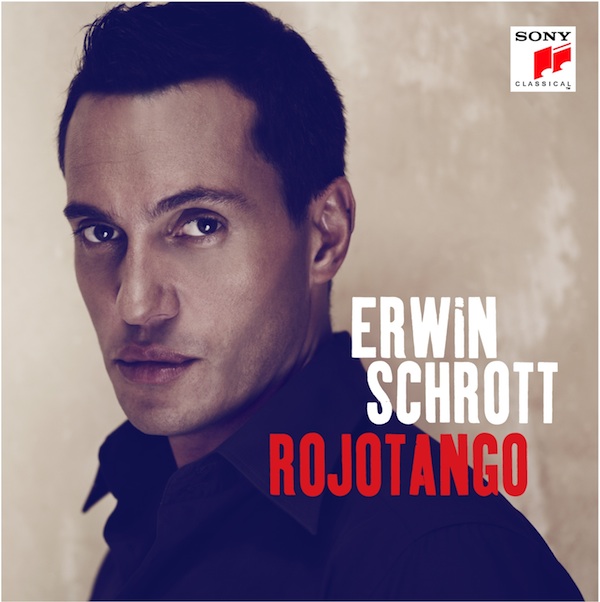
Red tangos by a red-hot star baritone
By Sebastián Spreng, Visual Artist and Classical Music Writer
Erwin Schrott. His name is German, though his looks suggest a cocky “compadrito” from the Rio de la Plata (River Plate). The young Montevideo-born baritone is one of the undisputed stars of today’s opera scene. To show his versatility, Schrott has recorded a recital paying tribute to his South American roots, a good habit fostered by the melting pot that is the operatic world, one that so many performers enrich with the music of their native lands.
And Schrott – one of the finest Mozartian baritones of our day – tackles a difficult program with the right strategy: Avoiding sounding like an opera singer as much as possible. Luckily, Schrott is not attempting “crossover.” He navigates this personal challenge by finding an intermediate range that complements the classical style of voice projection without turning off any segment of the audience.
“Tango is branded into my soul. Tango has built up a space in my heart,” he says. Yet he has not devoted his CD to the tangos of yesteryear, but to songs he obviously loves. He doesn’t attempt tangos that can’t hide the influence of opera – those Argentine mini-operas tinged with Italian “verismo” – but rather the “new tangos” of Astor Piazzolla and Pablo Ziegler (who is responsible for the superb orchestration and accompaniments, one of the record’s best features), interspersed with ballads by Chile’s Violeta Parra and Brazil’s Dorival Caymmi, Egberto Gismonti, Antonio Carlos Jobim and Caetano Veloso.
With the exception of some odd “r’s,” his pronunciation is faultless. A complete relief for the Spanish-speaking music fan, who often has no choice but to endure the artificial diction and erratic accent of non-Spanish divos. In a singer so clearly comfortable in his register, it’s puzzling to find a certain lack of depth in some low notes, or his opting for emphasized rather than contained expressiveness at certain moments. The rest comes to him naturally and honestly, devoid of affectation or preciousness, as he moves away from the conventional bass-baritone to become a full-fledged “cantor”(chanteur).
A son of Uruguay, that neutral land of unique, distinctive features that lies between Brazil and Argentina, Schrott is comfortable in both countries’ traditions, and shades of Caetano and Astor converge successfully in his singing. While “Milonga en el viento” and “Rojotango” (after which the CD is named) are carefully phrased, Piazzolla classics “Los pájaros perdidos” and “Chiquilín de Bachín” pour forth with fierceness from the very beginning. The lesser-known “Oblivion” (sung in French) and “Rinascero” (in Italian), from the same composer, explore other expressive possibilities. Schrott is absolutely right to balance the oppressive Buenos Aires mood with the nostalgic Brazilian lyricism of Gismonti’s “Agua y vino” and Caymmi’s “Savieros” (with an outstanding saxophone solo by Julio Botti), plus the optimism of Parra’s “Gracias a la vida” and Veloso’s “Desde que o samba e samba,” backed by Sara Erde and Rinat Shaham, a former Florida Gran Opera’s Carmen.
Rounding out the CD are Héctor del Curto’s invaluable contribution on the bandoneón, Ziegler’s performance on the piano and a polished presentation that includes an introduction by Nobel Prize laureate Mario Vargas Llosa, who praises his musical venture.
Hopefully there will be a second CD in which Schrott will consider braving classic tangos and milongas, going toe-to-toe with icons like Gardel or his countryman Julio Sosa. He has the talent and know-how to do it. He has the voice and the approach called for by an illustrious Argentine who felt almost Uruguayan, Jorge Luis Borges: Tango is a direct expression of something that poets have often tried to express in words: the belief that a fight may be a celebration. It’s like a heartbeat, something you can’t learn or understand. You can only love it and enjoy it. ERWIN SCHROTT, ROJOTANGO, SONY 88697727292
Recent Content
-
Artsarticle ·
-
Artsarticle ·
-
Artsarticle ·
